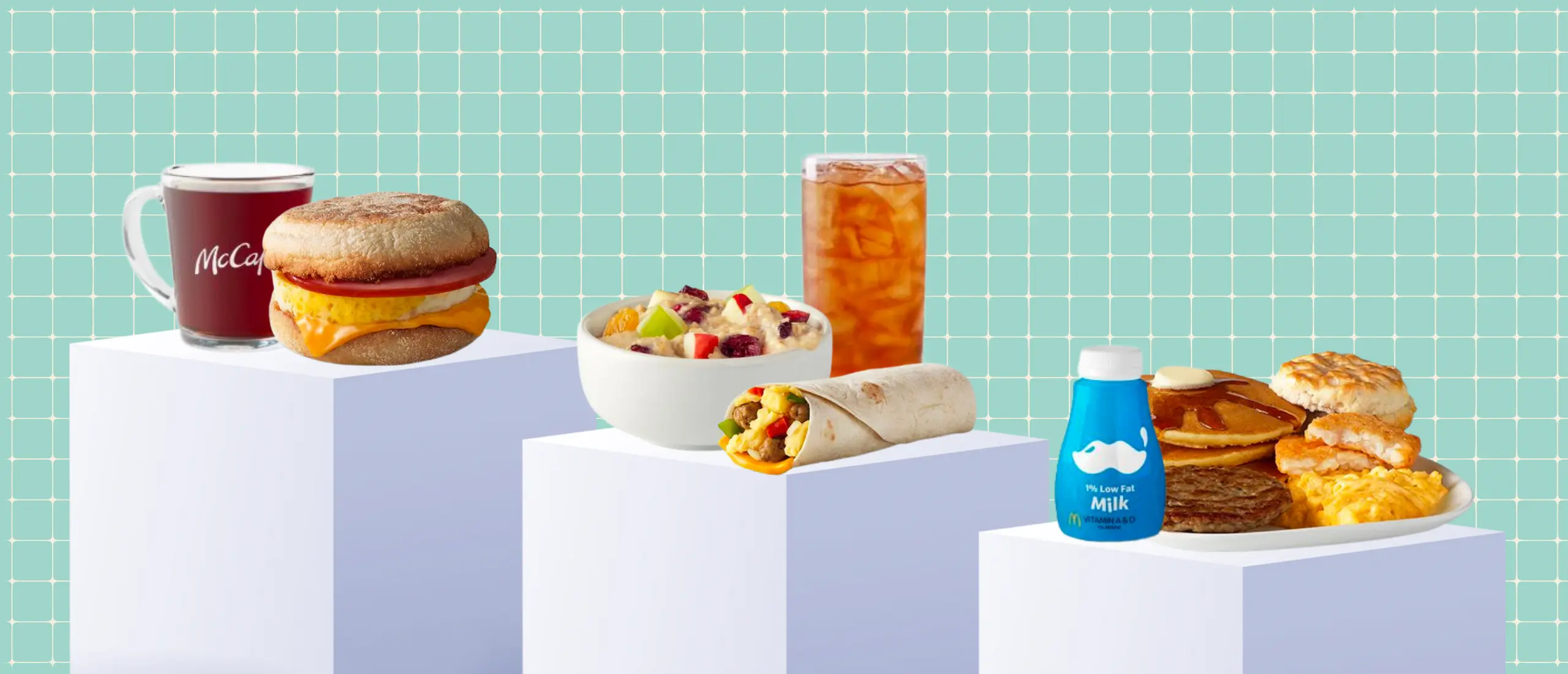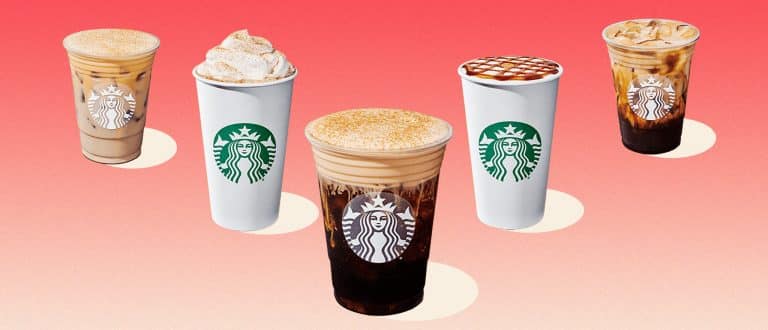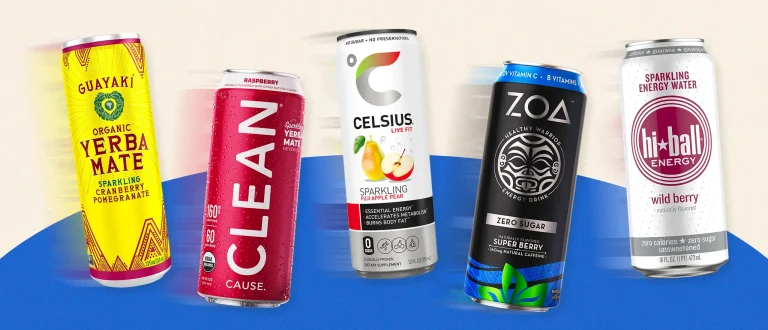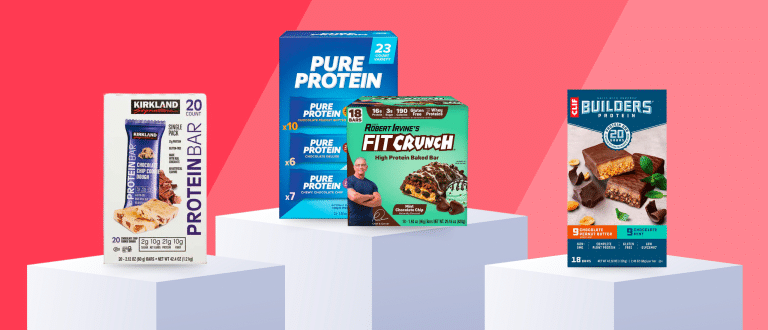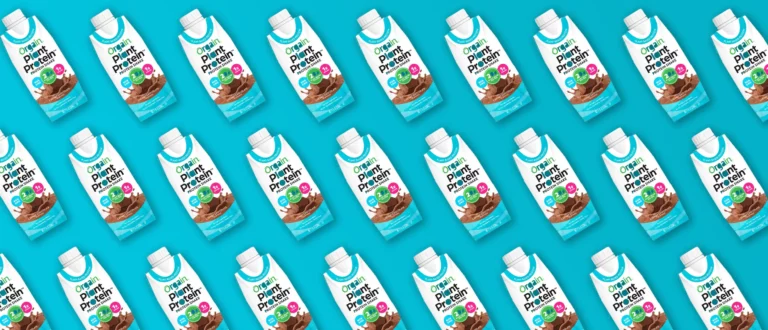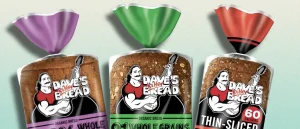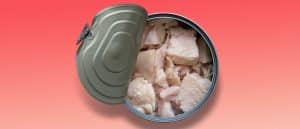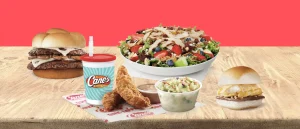The Healthiest McDonald’s Breakfast, According to a Registered Dietitian
- By Matthew Kadey, M.S., R.D.
- October 26, 2023
McDonald’s is the king of quick, convenient, and inexpensive fast food. Though the Golden Arches has cultivated a stigma for being particularly unhealthy, not all McDonald’s menu items are terrible for you. Take the McDonald’s breakfast menu. While items like the Big Breakfast (which brings in a whopping 1340 calories, 123 percent of the recommended daily maximum of saturated fat, and 91 percent of the daily sodium cap) are just as bad as they sound, McDonald’s also offers a few decent options that won’t overload your system with calories, saturated fat, and sodium.
Does this mean you should make a trip to the drive-thru a habit? Certainly, not. Eating from fast food restaurants too often is significantly associated with an increased risk of all-cause mortality, according to one study (1). A survey from the US Department of Agriculture found that people who reported not eating any fast food ate fewer calories and fat, and had an overall higher quality diet, than people who consumed fast food three times or more a week (2).
The key: to balance the occasional fast food indulgence with an overall healthy diet.
We scoured the entire McDonald’s breakfast menu for healthy options—taking calories, sodium, saturated fat, sugar, and protein into account. Next time you find yourself in a morning time crunch, here are the best (and worst) options you can order.
The Healthiest McDonald’s Breakfast Items
If you decide to make Mickey D’s your first meal of the day, make these menu options your go-to for staying on the straight and narrow.

1. Egg McMuffin
Per order: 310 calories, 30g carbs, 2g fiber, 3g sugar, 17g protein, 13g fat, 6g saturated fat, 150mg sodium
In terms of a balanced meal, the iconic Egg McMuffin might be your best bet. The duo of egg and lean Canadian bacon offers a solid amount of protein which will keep you feeling satisfied for hours. One study suggests eating eggs in the morning can lower feelings of hunger throughout the day which may help with overall calorie control (3).
A McMuffin is also one of your best options for keeping sodium in check. High levels of salt intake are linked with an increased risk of atherosclerosis, even for people without hypertension, per a 2003 study (4). Order it without the butter and the American cheese to slash saturated fat and sodium. Then add an order of apple slices for a boost of fiber.

2. Sausage Burrito
Per order: 310 calories, 25g carbs, 1g fiber, 2g sugar, 13g protein, 17g fat, 7g saturated fat, 800mg sodium
Filled with a mixture of scrambled eggs, sausage, veggies, and American cheese, the calorie-conscious Sausage Burrito has a similar nutritional profile to the Egg McMuffin. Though it’s a bit lower in protein and significantly higher in sodium, it still contains a solid balance of carbs, fat, and protein.
We also like that there are a few veggies tossed into the mix (onions and green peppers), which can’t be said about any other breakfast menu options from the Golden Arches.
Like the Egg McMuffin, pass on the processed cheese and you’ll trim two grams of saturated fat and 200 milligrams of sodium from the meal to make it better for your ticker.

3. Fruit and Maple Oatmeal
Per order: 320 calories, 64g carbs, 4g fiber, 31g sugar, 6g protein, 4.5g fat, 1.5g saturated fat, 150mg sodium
The Fruit and Maple Oatmeal is a solid choice to trim saturated fat and sodium and boost fiber. Oatmeal is a whole grain that delivers beta-glucan, a unique soluble fiber shown to improve levels of LDL cholesterol and apolipoprotein B which may slash the risk for heart disease (5). You’ll also score a couple of servings of fruit via the diced apple and dried cranberry-raisin blend.
Unfortunately, the bowl also packs 31 grams of sugar. A raft of research suggests that too much sugar can contribute to a host of woes including hypertension, kidney stones, and accelerated hair loss in men (6, 7, 8). Order it without the brown sugar to cut back. Since this item also only offers six grams of protein, consider requesting a high-protein add-on like scrambled eggs.

4. Sausage McMuffin with Egg
Per order: 480 calories, 30g carbs, 2g fiber, 2g sugar, 20g protein, 31g fat, 12g saturated fat, 830mg sodium
There are certainly better options that offer fewer calories, sodium, and saturated fat which can raise LDL (the bad kind) cholesterol (9), but the Sausage McMuffin with Egg delivers a surprisingly even balance of macros. This balance of protein, carbs, and fat tempers blood sugar fluctuations that can leave you feeling fatigued and ravenous. And the higher amount of high-quality protein in this sandwich might help you build lean muscle mass.
Research published in Cell Reports suggests that consuming protein at breakfast is more important for increasing muscle size and function than at other times of the day (10). Another found that skewing protein intake towards breakfast increased muscle growth in young men compared to those who consumed protein later in the day (11). Following the same sans-cheese-and-butter strategy, you can trim 70 calories and four grams of saturated fat while maintaining 18 grams of protein.

The Healthiest McDonald’s Breakfast Drinks
Stick with black coffee, hot tea, unsweetened iced tea, milk, or water to side-step the copious amounts of sugar added to other drink options like juice and soda. If you’re wondering why OJ doesn’t make the cut, you can thank the fairly high sugar count. It may be a great source of vitamin C, but it’s also a significant source of sugar at 41 grams in a single serving.
The Unhealthiest McDonald’s Breakfast Items
Most of the McDonald’s breakfast menu items are a nutritional landmine. Here are the options you’ll want to avoid.

1. Big Breakfast with Hotcakes
Per order: 1,340 calories, 158g carbs, 5g fiber, 48g sugar, 36g protein, 63g fat, 24g saturated fat, 2070mg sodium
This mega-breakfast includes a warm biscuit, savory hot sausage, scrambled eggs, crispy hash browns, and hotcakes with a side of butter and syrup. This meal provides an enormous amount of calories, carbs, saturated fat, and sodium—more than twice the calories and saturated fat as a Big Mac.
The high amount of protein might be this meal’s only redeeming quality, however, you’ll be better served filling your protein needs with an Egg McMuffin or two.

2. Hot Cakes
Per order: 580 calories, 101g carbs, 2g fiber, 40g sugar, 9g protein, 15g fat, 6g saturated fat, 530mg sodium
This refined carb and sugar bomb is a blood sugar spike waiting to happen. Imagine instead of hotcakes you dug into seven slices of white toast—that’s how many carbs are on that plate. And somehow, there is more sodium here than an Egg McMuffin.
Do your health a favor and make your own pancakes on the weekend with whole grain flour, a topping of berries, protein-packed Greek yogurt, and a moderate drizzle of authentic maple syrup.

3. Bacon, Egg, and Cheese Biscuit
Per order: 460 calories, 39g carbs, 3g fiber, 3g sugar, 17g protein, 26g fat, 13g saturated fat, 1330mg sodium
This indulgent option goes big on three things many Americans already consume too much of sodium, refined carbs, and saturated fat. The buttermilk biscuit is more calorie-dense than the English muffin used on other sandwiches and the processed bacon is high in saturated fat, sodium, and nitrates—the latter of which can form nitrosamines during the digestive process, which are compounds that have been associated with health issues including an increased risk of certain cancers (12).
The Bottom Line
McDonald’s isn’t the healthiest breakfast option out there, but there are a few menu items that are registered dietitian-approved in a pinch. The Sausage or Egg McMuffin, a Sausage Burrito, or the Maple Fruit & Oatmeal are among the healthier options available on the McDonald’s breakfast menu. Avoid sugary drinks like orange juice, and opt for black coffee, hot tea, or water.
References
1. https://linkinghub.elsevier.com/retrieve/pii/S2212267221000599
2. Hoy, K. et al. (2022). Diet Quality of Frequent Fast-Food Consumers on a Nob-Fast Food Intake Day is Similar to a Day with Fast Food, What We Eat in America, NHANES 2013-2016.
3. Missimer, A. et al. (2017). Consuming Two Eggs per Day, as Compared to an Oatmeal Breakfast, Decreases Plasma Ghrelin While Maintaining the LDL/HDL Ratio.
4. Wuopio, J. et al. (2023). The Association Between Sodium Intake and Coronary and Carotid Atherosclerosis in the General Swedish Population.
5. Ho, H. et al. (2016). The Effect of Oat β-glucan on LDL-Cholesterol, Non-HDL-Cholesterol and ApoB for CVD Risk Reduction: a Systematic Review and Meta-Analysis of Randomized-Controlled Trials.
6. Zhao, Y. et al. (2023). Sugar Intake and Risk of Hypertension: a Systematic Review and Dose-Response Meta-Analysis of Cohort and Cross-Sectional Studies.
7. Yin, S. et al. (2023). Association Between Added Sugars and Kidney Stones in U.S. Adults: Data from National Health and Nutrition Examination Survey 2007-2018.
8. Shi, X. et al. (2023). The Association Between Sugar-Sweetened Beverages and Male Pattern Hair Loss in Young Men.
9. Siri-Tarino, P. et al. (2010). Saturated Fatty Acids and Risk of Coronary Heart Disease: Modulation by Replacement Nutrients.
10. Aoyama, S. et al. (2021). Distribution of Dietary Protein Intake in Daily Meals Influences Skeletal Muscle Hypertrophy via the Muscle Clock.
11. https://academic.oup.com/jn/article/150/7/1845/5823851
12. Chazelas, E. et al. (2022). Nitrites and Nitrates From Food Additives and Natural Sources and Cancer Risk: Results From the NutriNet-Sante Cohort.



